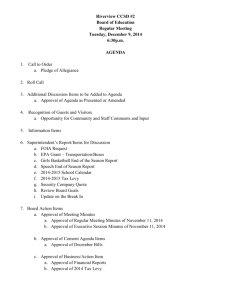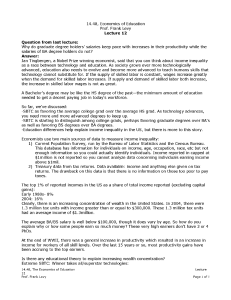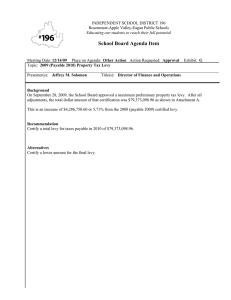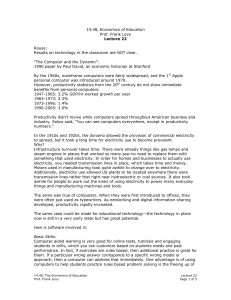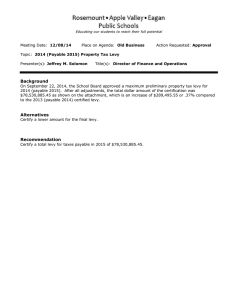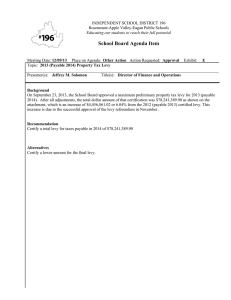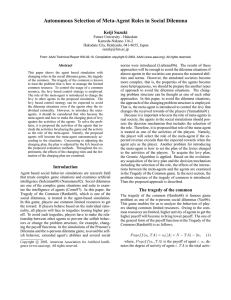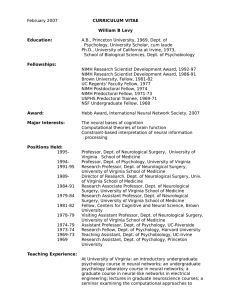14.48, Economics of Education Prof. Frank Levy -Thinking multiple steps ahead
advertisement
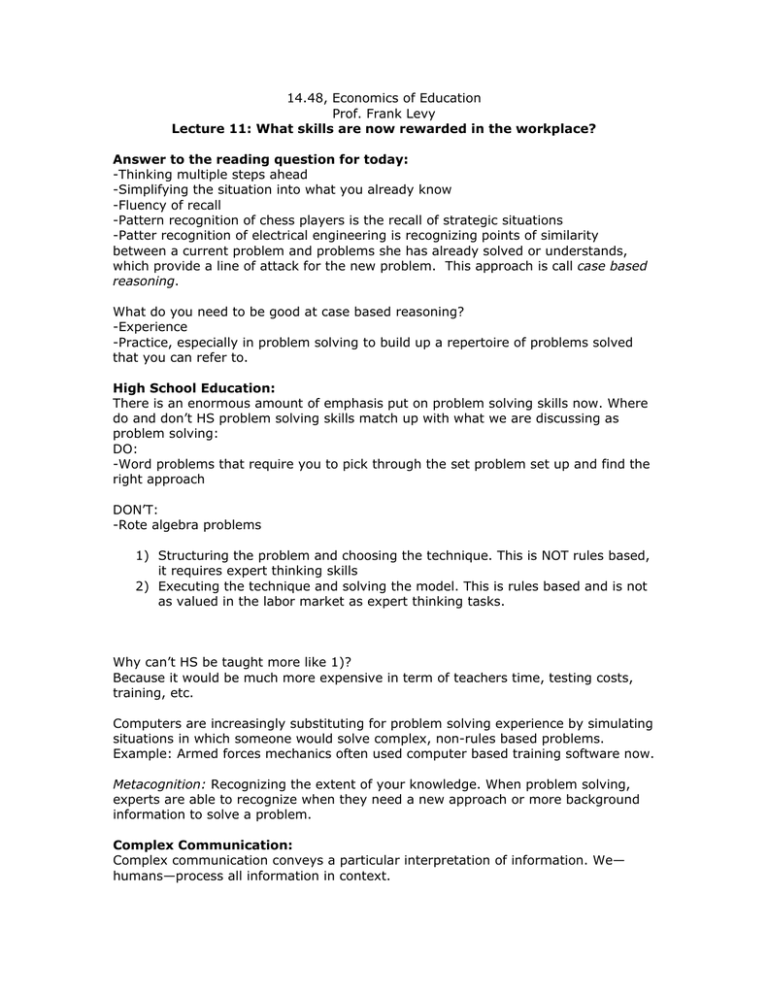
14.48, Economics of Education Prof. Frank Levy Lecture 11: What skills are now rewarded in the workplace? Answer to the reading question for today: -Thinking multiple steps ahead -Simplifying the situation into what you already know -Fluency of recall -Pattern recognition of chess players is the recall of strategic situations -Patter recognition of electrical engineering is recognizing points of similarity between a current problem and problems she has already solved or understands, which provide a line of attack for the new problem. This approach is call case based reasoning. What do you need to be good at case based reasoning? -Experience -Practice, especially in problem solving to build up a repertoire of problems solved that you can refer to. High School Education: There is an enormous amount of emphasis put on problem solving skills now. Where do and don’t HS problem solving skills match up with what we are discussing as problem solving: DO: -Word problems that require you to pick through the set problem set up and find the right approach DON’T: -Rote algebra problems 1) Structuring the problem and choosing the technique. This is NOT rules based, it requires expert thinking skills 2) Executing the technique and solving the model. This is rules based and is not as valued in the labor market as expert thinking tasks. Why can’t HS be taught more like 1)? Because it would be much more expensive in term of teachers time, testing costs, training, etc. Computers are increasingly substituting for problem solving experience by simulating situations in which someone would solve complex, non-rules based problems. Example: Armed forces mechanics often used computer based training software now. Metacognition: Recognizing the extent of your knowledge. When problem solving, experts are able to recognize when they need a new approach or more background information to solve a problem. Complex Communication: Complex communication conveys a particular interpretation of information. We— humans—process all information in context. Example: 2 weeks ago Professor Levy attended a 60th birthday party for Mary Jo Murnane. She and everyone else were delighted to be celebrating this 60th birthday. Why? Because 15 years ago she had cancer. What is Professor Levy wanted to describe the party to you. How would he do this? He could describe the: people, topics of conversation, music, food, drinking, notable events, clothing, etc. But it still wouldn’t capture or convey to you exactly what happened that night. What channels of communication exist between you and Professor Levy? -Words -Body language -Facial expressions -Tone of voice This is a small list of channels to convey exactly what happened at the party. Example question asked of elementary school students? Using orbits, draw a picture of why we have seasons. Most students drew a picture of a sun with an elliptical orbit traced around it. While this is a logical place for someone who has never learned about this to start, it is wrong. How do you explain to a child that this is wrong? What questions could you ask them to get at the right answer? 1) We know it is winter in Brazil when it is summer here and vice versa. How does that fit your picture? Basically, there should be a back and forth between the teacher and the student which can lead to an understanding of difficult concepts. Email: It is very easy to have communication mix-ups in an email conversation. You really need to get your phrases correct to minimize misunderstandings. Grading essays is very difficult because complex communication doesn’t allow for one right answer. Stockbroker reading: What is this all about? He is trying to get the client to understand his real problem and not his initial answer to the question. Mapping the brain: (add picture) 1) See a bear 2) Run (unconscious reaction) 3) Get scared (conscious reaction) Stored in our amigdala are our emotional memories. Stimuli: Say your roommate spills a coke on the rug. Case 1: You just received an A on a 6.17 exam and you are going on vacation tomorrow. 14.48, The Economics of Education Prof. Frank Levy Lecture 11 Page 2 of 3 Case 2: You just received a C- on a 6.17 exam and vacation isn’t for 17 weeks. You will react more favorably in Case 1 than in Case 2. Your mood affects your reaction to events. Communication in crafted to get people to react with certain emotions. Many decisions in life are a battle between complex thinking/decision making and spontaneous reactions. 14.48, The Economics of Education Prof. Frank Levy Lecture 11 Page 3 of 3
